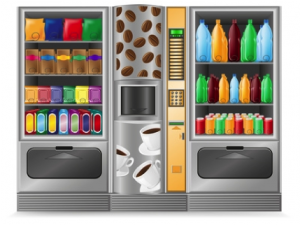Tired of the Same Old Vending Machine Junk?
Tired of the same old junk in vending machines? Now there are some new tools to do something about it and implement nutrition standards to vending machines in your office, city, or state. With two-thirds of Americans overweight or obese, it’s time to ensure healthful options are more available.
More and more people are interested in healthier snack options. According to a 2010 study by the Snack Food Association, about 74% of consumers are trying to eat healthier, with about 65% eating specific foods to lose weight. Instead of selling unhealthy food and beverages, which contribute to obesity and chronic diseases (heart disease, diabetes, cancer), your city, state, worksite, hospital, or university could ensure access to more healthful options. Offering healthy options demonstrates a commitment to addressing obesity and helps organizations that are working on nutrition and obesity to “walk the walk.”
The National Alliance for Nutrition and Activity (NANA) recently completed model beverage and food standards for vending machines and a model policy to implement them. The vending standards could be used:
- In your own office building;
- In a state or local bill to require healthy vending standards on state/local property (agency buildings, state parks, highway rest stops, etc.);
- To encourage a hospital, university, or organization to move to healthy vending;
- In an agency policy, executive order, regulation, or other executive branch approach to implement vending standards in states or localities; or
- As standards for any other location with a vending machine.
The vending standards, model policy, and additional resources are available at www.cspinet.org/nutritionpolicy/foodstandards.html. NANA also is working to develop a list of products that meet the vending standards and a factsheet about the impact of healthy vending standards on revenue, and to identify success stories. To share success stories about vending or food procurement policies, for more information about healthier food choices on public property, or to discuss how you might use the NANA model standards, please contact us at kbishop@cspinet.org.
Margo G. Wootan is the director of nutrition policy at the Center for Science in the Public Interest (CSPI), one of the country’s leading health advocacy organizations that specializes in food, nutrition, and obesity prevention. Dr. Wootan received her B.S. in nutrition from Cornell University and her doctorate in nutrition from Harvard University’s School of Public Health. Wootan co-founded and coordinates the activities of the National Alliance for Nutrition and Activity (NANA) and the Food Marketing Workgroup. She has coordinated and led efforts to require calorie labeling at fast-food and other chain restaurants, require trans fat labeling on packaged foods, improve school foods, reduce junk-food marketing aimed at children, and expand nutrition and physical activity programs at CDC. Wootan has received numerous awards and is quoted regularly in the nation’s major media.
Katherine Bishop is a nutrition policy associate at the CSPI. Ms. Bishop received her B.A. in political science from the University of Rhode Island, and her M.S. in nutrition and M.P.H. in public health from Tufts University. Prior to working at CSPI, Ms. Bishop spent four years in the Massachusetts Legislature, as Legislative Aide then Legislative Director to a State Representative. In addition, during graduate school, Ms. Bishop worked with the Massachusetts Public Health Association and the Nutrition Policy Department at the World Health Organization.
This piece was originally published on the communitycommons.org blog on 1/2/2013: http://www.communitycommons.org/features/tired-of-the-same-old-vending-machine-junk/
